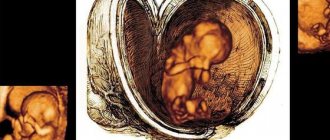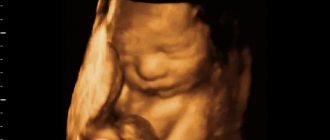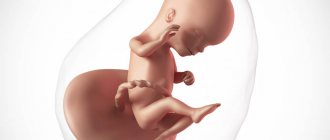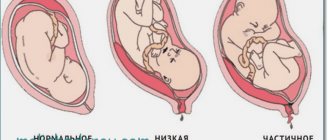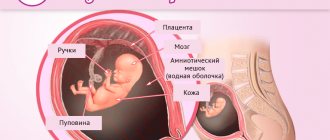Now you have already reached the 11-12 week mark of pregnancy. Is this a lot or a little?
Doctors say that this is the child’s first anniversary. Mom still has the first trimester behind her, which is considered the most painful. In addition, it was accompanied by a high probability of miscarriage, which is now becoming less and less. Now you can please your relatives and friends with the great news about the imminent addition to the family. The golden time of gestation is ahead. Both the physical and moral well-being of the pregnant woman improves, and the new life in the tummy continues to actively grow and develop.
Many people are interested in: 12 weeks of pregnancy – how many months? You and your baby have been side by side for 3 months.
What happens to the baby at 12 weeks?
Although the organs and vital systems of the unborn child are fully formed and are already functioning, they continue to improve. The intestines are already located in the abdominal cavity and begin to gradually contract. The liver produces bile, the kidneys excrete urine, and the nervous system coordinates the work of the small organism.
Fetal parameters at 12 weeks:
- Weight – 14 g;
- KTR – from 6 to 9 cm;
- The volume of amniotic fluid is 50 ml.
At week 12, the cerebral cortex is formed, at this stage its projection is similar to the silhouette of a butterfly. New opportunities allow the baby to move freely, moving in the uterine cavity, move his arms and legs, touch his face with his fingers, place them in his open mouth, and grimace. The development of skin receptors increases the sensitivity of the fetus; it senses the mother’s movements, her coughing, sneezing through the amniotic fluid.
Marigolds have already begun to form on the fingers and a unique skin pattern on the pads. The top layer of skin (epidermis) began its first renewal, peeling off over the entire surface of the body. On the face, in the place where the eyebrows and eyelashes will be, as well as on the chin and upper lip, the beginnings of vellus hair appear.
Changes also appeared in the circulatory system - the bone marrow began to produce leukocytes, now together with red blood cells they create the immune system.
Fetal heartbeats are clearly audible during Doppler ultrasound. The thyroid gland and pituitary gland begin to produce their own hormones. Small joints are formed, bone tissue matures.
Fetus. Development at 12 weeks
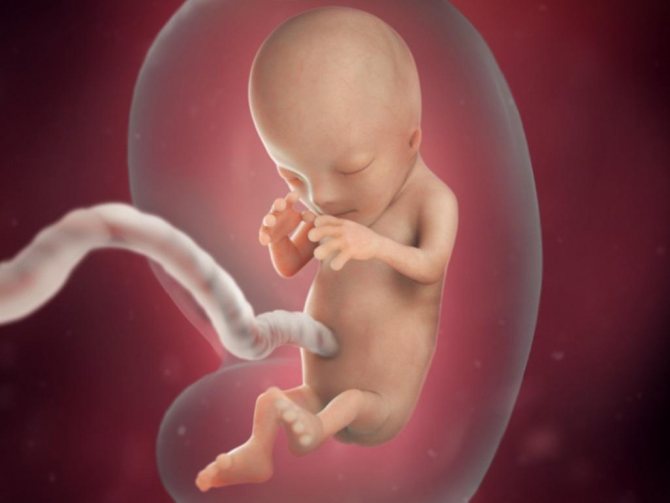
Fetus at 12 weeks of gestation
At the 12th obstetric week of pregnancy, the fetus continues to actively grow.
At the current stage, it can already reach a length of 8 cm and weigh about 15 g.
The unborn baby is actively moving through the uterus, but the woman does not feel it yet.
The main systems and organs are already working, but there are still many transformations ahead.
At the 12th week of pregnancy, the formation of the head and face of the unborn child continues.
Complex processes of hearing formation are taking place. The outer auricle has acquired cartilage, which provides shape, and an earlobe; the inner ear, responsible for transforming the information received, is developing.
The baby can already hear some sounds, but the hearing system has not yet fully formed. This process will continue throughout pregnancy and for some time after birth.
If we could look at the face of the fetus at the 12th obstetric week of pregnancy, we would note that the forehead, compared to the face, is still very large.
The eyes are at an unusual distance, but are already closer than in previous weeks. The ears are set too low. Gradually the situation will change, and very soon all the elements of the face will take their usual place.
The baby's eyes continue to develop. The iris receives color pigment, and instead of the film covering the eyeball, the eyelid is formed.
The nose is already very similar to a normal one; the rudiments of teeth are actively forming.
This week, the baby is already actively opening and closing his mouth, periodically swallowing a small amount of amniotic fluid.
The nervous system continues to improve. The network of nerve endings is becoming wider and new neurons are constantly appearing in the brain.
During the current period, the pituitary gland is actively working: it produces hormones that promote fetal growth.
The muscular system is constantly increasing. Enveloping all the cartilage, it forms the muscular skeleton.
After birth, the fetus will have to learn to use this complex structure to propel its body. But for now, the first reflexes are enough for him to calmly swim from wall to wall in the uterus.
The food system is also undergoing changes. The intestines enlarge, the larynx makes its first attempts to contract in order to swallow food.
When a baby accidentally swallows amniotic fluid, it enters the gastrointestinal tract.
At this moment, the gallbladder produces bile, juice appears in the stomach, the kidneys filter the incoming substances and remove excess from the child’s body.
Important! A woman during pregnancy should drink enough fluids to help cleanse her own body and the body of the fetus. It is advisable to drink 2 - 2.5 liters per day. It is recommended to give preference to plain drinking water.
At the 12th week of pregnancy, the fetus receives oxygen through the umbilical cord, but the respiratory system is already well formed. But she also continues to improve.
At the current stage, you can see how, with the next contraction of the heart, the chest rises slightly, where at the 12th obstetric week of pregnancy only 3 of the total blood flows, which allows it to develop and train normally.
Everything will change after birth, when, along with the baby’s first cry, a substance will begin to be produced that facilitates the transition from the rudimentary method of breathing (through the umbilical cord) to the usual one (through the lungs).
The holes in the heart (foramen ovale, ductus arteriosus) will begin to close, ensuring sufficient blood pressure in the lungs.
At the 12th week of pregnancy, the genitals of the unborn child appear, but it is not always possible to easily recognize them on an ultrasound. At the current time, there is still a high probability of error.
By the end of the first trimester of pregnancy, the fetus has all formed organs and can protect itself from some harmful factors.
From the end of the 12th week, the unborn baby is less susceptible to the influence of medications and infections. But a woman should not relax. Despite the increased ability to resist harmful factors, the fetus is still very vulnerable.
Uterus and belly
At this stage of pregnancy, the uterus begins to rise above the level of the womb, since it no longer fits in the pelvis. A pregnant woman will immediately feel these changes, since the uterus no longer puts so much pressure on the bladder, and the frequent urge to urinate stops. Now a new problem may appear - due to the growing uterus, intestinal motility is disrupted and constipation appears.
The width of the uterus at week 12 is approximately 10 cm. The hormonal background of pregnancy is completely supported by the placenta. The hormone estradiol is produced in a volume 5-6 times higher than the same indicators before pregnancy. Estradiol and progesterone ensure the growth of the uterus and reduce its contractility.
A pregnant woman's belly is not yet visible, although in thin women carrying a child for the first time, roundness below the waist is already noticeable. During the second and subsequent pregnancies, as well as in the case of twins, an increase in the abdomen can be noticeable by clothes that suddenly become tight.
Features of the 2nd trimester
The second trimester lasts from 12 to 24 embryonic weeks, or from 14 to 26 obstetric weeks. To avoid confusion, let us recall: the embryonic period of pregnancy begins from the day of conception, which, as is known, is possible only during the period of ovulation. For simplification, gynecologists and ultrasound programs use obstetric weeks, when the beginning of pregnancy is conventionally considered to be the 1st day of the last menstruation (i.e. 14 days earlier). The obstetric pregnancy calculator is only correct for women with a regular cycle of 28 days.
Normally, if toxicosis has subsided in the 2nd trimester, your health has improved, the fetus is developing and gradually gaining weight and height. Short-term tone of the uterus, slight swelling of the legs, mild nagging pain in the lower back, increased clear or whitish vaginal discharge, a slight decrease in blood pressure, decreased concentration, episodes of headaches - such changes in the body should not scare you. Hormonal changes have an effect; as the child grows, the uterus stretches, putting pressure on the internal organs, causing discomfort, increased urge to urinate, mild pain, and swelling.
Only from 16 to 20 embryonic (from 18 to 22 obstetric) weeks does the risk of late miscarriage increase, which is often associated with isthmic-cervical insufficiency (premature shortening of the cervix), sexually transmitted infections, placental abruption or placental previa (occlusion of the uterine pharynx). However, deterioration in health, nausea, severe swelling of the face and body, and high blood pressure may indicate the development of gestosis. It is also necessary to consult a doctor immediately in case of severely low blood pressure, bleeding, or hypertonicity of the uterus (manifested by sharp or prolonged pain and a feeling of heaviness in the lower abdomen).
From the middle of the trimester, itching often occurs, either localized or throughout the body. If it is not accompanied by a rash, a possible cause is stretching of the skin due to the increase in the woman’s shape or a reaction to an increase in estrogen in the body. However, sometimes itching occurs in response to allergens (household chemicals, food products, cosmetics) and stress, or due to liver dysfunction, bile stagnation, as well as infections and viruses (hepatitis, herpes, fungal skin diseases, etc.). Then it is necessary, if possible, to eliminate the cause: adjust nutrition, reduce emotional stress, and use medications prescribed by a doctor to increase the outflow of bile. In any case, a consultation with a gynecologist is necessary; self-medication during pregnancy is doubly dangerous.
Weight of a pregnant woman at 12 weeks
From this stage of pregnancy, stable weight gain begins. Every week your body weight will increase by 0.5 kg. If there was no early toxicosis, when a woman loses some weight due to poor appetite, then before this period a weight gain of 1.5-3.5 kg has already occurred. Too high a rate of gaining kilograms is undesirable, as it is an additional burden for the body, which already has to work “for two”.
A pregnant woman’s body weight increases due to an increase in the weight of the fetus, amniotic fluid, uterus and placenta, mammary gland tissue and subcutaneous fat. To control your figure, you will have to limit frequent “snacks”, change a sedentary lifestyle to feasible physical exercise, and walks in the fresh air.
It is possible and it is not possible
The rules of behavior for a pregnant woman at the 12th week remain the same.
The expectant mother should:
- avoid alcohol, active and passive smoking, drugs;
- do not take medications and vitamins without a gynecologist’s prescription;
- follow a daily routine and diet. Sleep at least 10 hours at night, rest during the day if possible;
- Eat food 5-6 times a day, in small portions, every 2-3 hours;
- exclude soda, smoking, pickles, fast food;
- avoid white bread and buns, giving preference to dark varieties made from wholemeal flour;
- engage in permitted sports: walking, swimming, yoga, Pilates, water aerobics, but without severe physical overload;
- be outdoors every day. It is optimal to walk in a park or forest;
- monitor hygiene and cleanliness of the premises. It is recommended to carry out wet cleaning daily, change bed linen twice a week;
- drink enough fluid (2 to 2.5 liters);
- start wearing maternity clothes, things with a loose fit;
- give up high heels;
- Make sure that the bra does not pinch your breasts and does not cause excessive sweating. It is recommended to give preference to a special option for breastfeeding women;
- avoid contact with sick people, minimize visits to crowded places;
- Avoid stress and try to quickly overcome its manifestations.
The rules for pregnant women are very simple and understandable to everyone, because they are built on the principles of a healthy lifestyle.
By getting rid of bad habits during this period, you can show your future child a good example worthy of imitation from the first day.
Sex
At the 12th week of pregnancy, intimate life is allowed, especially if the woman feels the need for it.
The exception is expectant mothers whose doctor has forbidden sex due to suspicions of complications during pregnancy.
Feel
Symptoms of toxicosis become a thing of the past, and along with them, emotional instability and mood swings go away. Due to the growth of the uterus and impaired blood flow in the pelvic vessels, a predisposition to varicose veins may occur. To prevent this condition, you should wear compression tights, stockings, and bandage your legs with an elastic bandage. Such measures will help to avoid excessive blood filling of the veins of the lower extremities. Increased blood flow can also cause dizziness and headaches.
Fluid retention in the body can cause swelling of the face, arms and legs. To prevent this condition, you should reduce the salt content in your food and normalize your drinking regime.
The hormone prolactin helps to enlarge the mammary glands, preparing them for breastfeeding. At this stage of pregnancy, the first stretch marks may appear on the skin of the chest and abdomen - stretch marks. Their occurrence can be partially prevented by rubbing moisturizer and olive oil into the skin.
Due to the action of progesterone, which has a relaxing effect on the body tissues of a pregnant woman, the septum between the esophagus and stomach loses its tone. A small amount of gastric juice is thrown into the esophagus, and the pregnant woman feels heartburn.
Possible preventive measures:
- Drink clean, cool water;
- Drink 1/2-1 glass of milk;
- Eat often, in small portions.
Feelings in the abdomen, what is happening, ultrasound, symptoms, screening, doctor’s advice:
Fetal ultrasound
A period of 12 weeks is the best time for the first ultrasound examination of the fetus, if it has not yet been performed.
Ultrasound results:
- Condition of the uterus and placenta, uterine tone;
- Exact gestational age, possible due date;
- Fruit size, number of fruits;
- The presence or absence of deviations in the child’s development.
If an ultrasound scan allegedly reveals fetal malformations or finds signs of genetically determined pathologies, the woman is sent for an in-depth examination and a consultation with a geneticist. Complex pathologies may require termination of pregnancy.
Is it harmful to have an ultrasound at 12 weeks of pregnancy?
Recommendations for the expectant mother
At 12 weeks, you can begin to sanitize the oral cavity and cure teeth from caries. Fetuses need calcium to develop bones and teeth, so your teeth and bones may not get enough calcium if you don't get enough from your diet. The recommended norm is 200 g of cottage cheese per day, while phosphorus and fish oil must be present, that is, you need to add fatty fish to your daily diet. If there is still not enough calcium, it is washed out of the pregnant woman’s teeth and bones. Then she will have to take it in tablet form in courses on the advice of a doctor. The hormonal background of pregnant women contributes to softening and bleeding of gums. Therefore, maintain oral hygiene: brush your teeth 2 times a day, after each meal (preferably) rinse them with herbal decoctions (oak bark, St. John's wort, chamomile, calendula). This way you will avoid inflammation of the gums and oral mucosa, called pregnancy gingivitis.
What does screening determine at 12 weeks of pregnancy?
A comprehensive study on the pathology of fetal development is carried out in each trimester, and the first of them is at 11-13 weeks of pregnancy. In addition to ultrasound, screening includes a double test - a biochemical blood test:
- Determination of the concentration of free human chorionic gonadotropin;
- Determination of the concentration of PAPP-A (plasma protein A).
During an ultrasound, the parameters of the fetal collar zone are examined - the area of fluid accumulation between the skin tissues. This variable indicator provides informative results only from weeks 11 to 13. The dimensions of the collar zone are different in normal conditions and in the presence of chromosomal abnormalities such as Down syndrome or Edwards syndrome.
Determining an increased amount of hCG in the blood of a pregnant woman will help to timely detect the risk of trisomy 21 (Down syndrome) in the child, and a reduced amount will help to detect the risk of trisomy 18 (Edwards syndrome). The results obtained are not a death sentence; they require confirmation by more accurate tests, for example, an extremely informative study of fetal chorionic villi. A woman with suspected chromosomal abnormalities of the fetus or genetic pathologies must consult a geneticist.
Hi baby! Screening and first ultrasound
Now is the time to donate blood for biochemistry and go for an ultrasound examination. At this stage, absolutely all examinations are safe for the expectant mother and baby.
Screening in the first trimester is very important. It is he who helps to determine possible congenital pathologies of fetal development: disorders of the rudiment of the central nervous system, the presence of Down syndrome, Edwards syndrome and other abnormalities.
Screening includes a biochemical blood test and ultrasound examination. The time frame for its implementation is limited to 10-14 weeks. It is believed that the ideal time is 11-12 weeks of pregnancy.
Ultrasound: norms and interpretation
The woman is looking forward to her first scheduled ultrasound with great anticipation. After all, she will finally see her little one and find out about his state of health and development. Ultrasound measures the child's height (CT), the circumference of his head, the length of the femur and humerus, the size of the nasal bone, and heart rate. Sometimes at this time they even provide preliminary information about what the gender of the child will be.
Based on the CTE indicators and other measurements, the first ultrasound can indicate the exact number of weeks from conception (fetal age).
Fetal development norms according to ultrasound
| Fetal age | KTR | BPR | Heart rate | TVP | Nasal bone |
| 10 weeks | 31-41 mm | 14-20 mm | 161-179 beats/min | 1.5-2.2 mm | determined, impossible to measure yet |
| 11 weeks | 42-50 mm | 13-21 mm | 153-157 beats/min | 1.6-2.4 mm | determined, impossible to measure yet |
| 12 weeks | 51-60 mm | 18-24 mm | 150-174 beats/min | 1.6-2.5 mm | more than 2.5 mm |
In deciphering ultrasound results, the most important parameter is TVP (thickness of the collar space. By its value, the doctor can assess the risks of developing genetic pathologies of fetal development.
Blood chemistry
This analysis provides information about the amount of certain hormones in the mother’s blood, which can be used to judge the development of the fetus. The most important of them are: hCG and PAPP-A.
From the first days after conception, the hCG hormone constantly increases and reaches its maximum by the 12th week, after which its amount in the blood decreases and remains unchanged throughout the rest of the pregnancy. PAPP-A is produced by the placenta and its value corresponds to the duration of pregnancy.
| Fetal age | HCG norm, ng/ml | PAPP-A norm, honey/ml |
| 10 weeks | 25,8-181,6 | 0,45- 3,73 |
| 11 weeks | 17,4-130,4 | 0,78 — 4,76 |
| 12 weeks | 13,4-128,5 | 1,03 – 6,01 |
What does a deviation from the norm indicate? Decoding
A low hCG level may mean a threat of miscarriage and a risk of developing Edwards syndrome. A significant deviation from the norm to a lesser extent often indicates a frozen pregnancy. An elevated hCG value may indicate the presence of Down syndrome in the fetus. However, do not panic, as a high level of this hormone can also indicate a multiple pregnancy. In addition, its high level is recorded in a number of other cases: the presence of diabetes mellitus in the mother, severe toxicosis, maternal obesity, etc.
Reduced levels of PAPP-A also indicate a risk of fetal developmental disorders. Its increased amount is rare and is quite normal.
By comparing the results of ultrasound and blood biochemistry with established standards, and also taking into account the peculiarities of pregnancy (second pregnancy, multiple, late), the doctor can draw conclusions about how the child’s intrauterine development proceeds.
What tests should be taken at 12 weeks?
In addition to screening studies, a woman who has not previously registered for pregnancy undergoes the following tests:
- For blood biochemistry;
- General blood analysis;
- Blood group and Rh factor;
- Blood for sugar;
- General urine analysis;
- Smear for urogenital infections;
- Pap test;
- Blood for AIDS, hepatitis, syphilis.
If a pregnant woman has already visited an antenatal clinic in the early stages and feels satisfactory, tests are limited to a general blood and urine test.
Painful sensations
Normally, at this stage of pregnancy, a woman may feel slight nagging pain on the right, left and lower abdomen. They are explained by stretching of the ligaments that support the growing uterus, as well as a shift in the center of gravity and the reaction of the vertebral discs to this.
Another cause of pain in the lower abdomen is cystitis, or inflammation of the bladder, which often occurs for various reasons during pregnancy. The source of infection in the urinary tract should be eliminated immediately by contacting a urologist. You need to tell your doctor about your pregnancy so that he can select safe medications. Strict adherence to the recommendations will help avoid the transition of acute cystitis to a chronic form.
It is dangerous if pain in the lower abdomen is accompanied by bloody discharge from the vagina. Their spasmodic nature and duration of at least 2-3 hours should alert the woman. These are symptoms of an incipient miscarriage, which should be eliminated in a hospital setting. Timely treatment will help avoid placental abruption and maintain pregnancy without consequences for the fetus.
What happens to the expectant mother: changes in the body and well-being
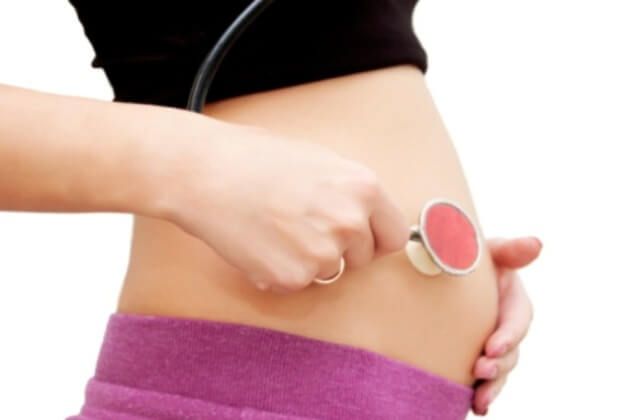
Sensations at the 12th week of pregnancy enter a favorable phase. Morning sickness is left behind, nausea recedes. Thanks to hormones, women in labor “bloom” before our eyes. Their complexion changes. Hair becomes silky.
But your emotional state still remains unstable: now you can worry about any trifle, or even for no reason. But after 5 minutes you are happy and smiling.
Now is the time to register with a gynecologist. Now you need to visit his office once or twice a month.
Externally, changes in the appearance of the future woman in labor become noticeable to observant people around her. A rounded tummy is outlined. The uterus has already grown by at least 10 cm and, naturally, it does not have enough space. That's why she starts to come forward. Every 7 days she will gain another centimeter. You can still hide your “interesting position” behind spacious outfits. But you should already go shopping and buy special clothes for pregnant women.
Some of the unpleasant features of the situation include:
- Increased stress on the heart, liver and kidneys.
- Heartburn and constipation may still bother you.
- Fatigue sets in.
- There is a lack of fresh air.
- Pigment spots may appear on the skin, but do not worry - they will go away after childbirth. The same applies to the dark stripe on the stomach.
- There is a threat of varicose veins.
All necessary nutrients are supplied to the fetus through the circulatory system, so the increased blood volume causes tachycardia.
The hormone progesterone is now produced by the placenta, and not by the corpus luteum, which is now withering (it was in the place of the mature egg).
What is pleasant for many girls is that the volume of the bust begins to increase. Another positive thing is that the urge to go to the toilet becomes less frequent.
As for weight, some may gain a couple of kilos, while others, on the contrary, lose them. Both are within normal limits.
Discharge. Discharge that is white, milky, or with a yellowish tint is considered normal and not cause for concern. Perhaps they will give off a sour aroma.
Purulent or mucous discharge indicates the presence of candida fungus. Simply put, you have developed thrush, which urgently needs to be cured.
But if you notice bloody spots on your underwear, accompanied by itching, burning, a strong unpleasant odor and even pain in the lower abdomen, this is a serious reason to contact an antenatal clinic.
Pain. In general, nothing should bother a woman. But barely perceptible pain in the lower abdomen is acceptable. The fact is that the ligaments that hold the uterus begin to stretch and create some discomfort.
The lower back may also ache. The belly, which gradually begins to enlarge at the 12th week of pregnancy, shifts the center of gravity and this is reflected precisely in the back. But it can also indicate problems with the bladder, namely inflammation or infection. To save yourself from unnecessary worries, consult a doctor.
Bleeding and its causes
If vaginal discharge has a red or brown color of coagulated blood, accompanied by pain in the lower back and lower abdomen, you need to urgently get qualified medical help. It is quite possible that this is an ongoing abortion, posing a threat to the life of the child. If bleeding is caused by sexual intercourse or manipulations by a gynecologist, this is most likely a symptom of cervical erosion. This diagnosis needs to be confirmed and a course of treatment carried out after childbirth.
Vaginal discharge
The appearance of discharge at this stage of pregnancy is determined by the action of hormones - progesterone and estrogen. The discharge is small in volume, transparent or milky white, homogeneous, and practically odorless. Deviations from the norm, the appearance of pus, mucus in the discharge, the addition of an unpleasant odor, changes in structure are a sign of infection of the vagina, a symptom of an STD or candidiasis. All pathologies must be treated as soon as possible, since waste products of pathogenic bacteria can penetrate the placental barrier.
Risk factors
By the end of the first trimester, when 12 weeks of pregnancy are behind you, the danger of losing your baby decreases every day, and you can breathe a sigh of relief. However, there are always risks associated with injury, poisoning and stress. Also, the expectant mother should be wary of colds and increased body temperature.
Sometimes at this stage a frozen pregnancy is discovered. Characteristic signs of such a pathology are a sharp cessation of toxicosis and pain in the mammary glands, a decrease in basal temperature, spotting, abdominal pain, and leakage of amniotic fluid. If you notice any of these symptoms during the 12th week of pregnancy, contact your doctor immediately.
Viral respiratory diseases
Colds accompanied by high fever can affect a pregnant woman due to a temporary weakening of the immune system. Complications of acute respiratory infections and acute respiratory viral infections can negatively affect the health of the fetus, cause hypoxia, and spontaneous abortion. You should not self-medicate colds, as some medications are contraindicated during pregnancy.
Possible treatment measures:
- Bed rest, ensuring rest;
- Drink plenty of water - tea, lingonberry and cranberry fruit drinks, currant infusion;
- Treatment of cough with warm milk with honey or Borjomi mineral water;
- Rinse the nose and rinse the mouth with saline solution.
Complications of a cold in the form of a severe cough, high fever, and headaches are treated in a hospital setting.
Temperature increase
Progesterone still affects the woman’s health and increases her body temperature to +37+37.5°C. If a general blood test, which a woman takes regularly when visiting a gynecologist, shows an increased level of leukocytes and a high erythrocyte sedimentation rate, then the temperature is due to a latent infectious process or an exacerbation of somatic diseases.
Hyperthermia can jeopardize pregnancy and cause miscarriage, so this condition should not be ignored. The temperature is reduced by wiping with a damp cloth, and minimal doses of paracetamol are taken.
Video about the causes of miscarriage, the condition of the fetus at 12 weeks:
attitude to alcohol
Ethyl alcohol toxins can penetrate the fetus’s body, causing intellectual impairment, developmental defects, and even alcohol addiction. Even if a child is born outwardly healthy, he may still experience minimal damage to brain structures, which subsequently leads to persistent poor performance at school and antisocial behavior. To do this, it is enough to take a minimum dose of alcohol during the formation of the central nervous system of the fetus.
Diet at 12 weeks
A sufficient amount of fiber in the diet, most of which is consumed raw, in vegetable and fruit salads, will help avoid constipation. The main dishes of a pregnant woman's diet are dairy and lactic acid products, low-fat baked fish or meat. It is advisable to move the main meal to the first half of the day, leaving a light dinner, a fruit afternoon snack and a glass of milk, fermented baked milk or kefir for the night. You should not try to eat “for two” - excess weight will become a burden for the body and create an unwanted load on the cardiovascular system.
